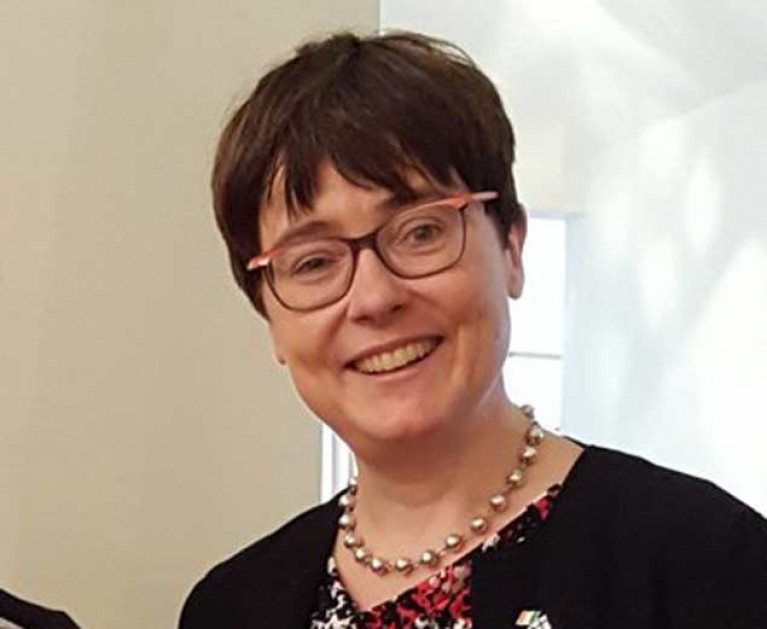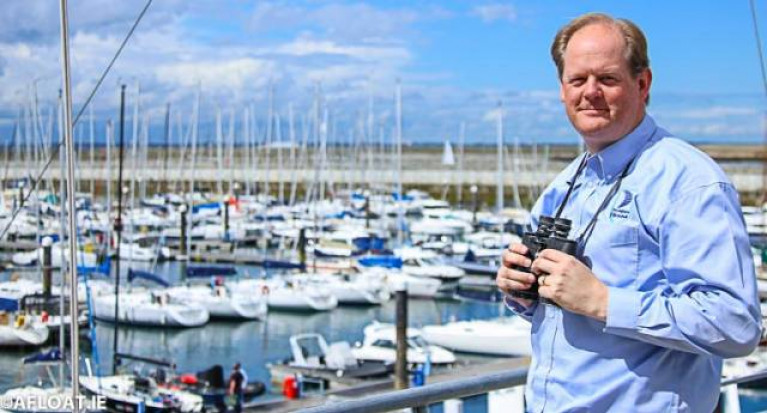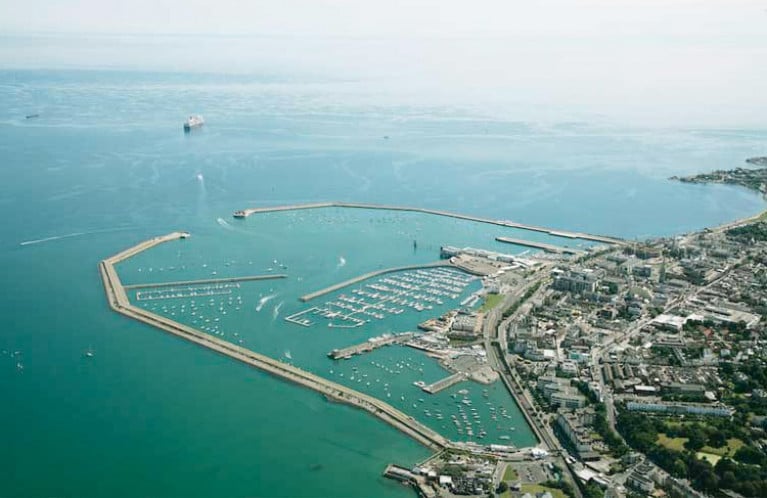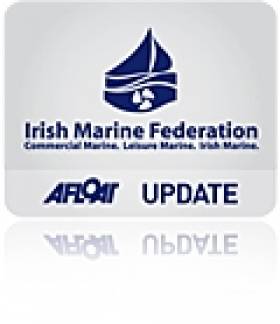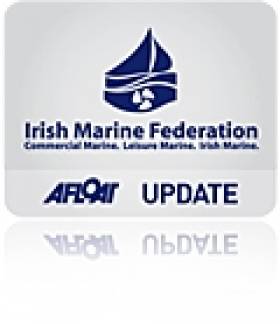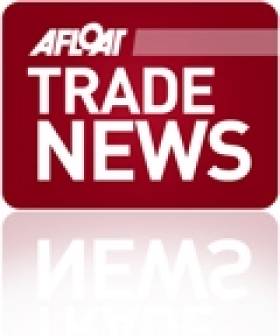Displaying items by tag: IMF
Irish Marine Federation Elects New Chairman Who Plans Expanded Scope for Membership in 2022
Jonathan Moneley has been elected chairman of the Irish Marine Federation (IMF), the trade body representing marine leisure and commercial maritime interests in Ireland.
Moneley was elected at the IMF’s AGM on Thursday 24 March and takes over from Paal Janson of Dun Laoghaire Marina, who held the position since January 2019.
Thirty-three-year-old Moneley is the general manager of Carlingford Marina in Co Louth and has worked as part of the family business for most of his life.
He has a BA in Public Relations and is one of fewer than 500 people accredited as a Certified Marina Manager by the Global Marina Institute.
In one of his first charges, Moneley hopes to encourage new membership applications to the IMF, and to broaden the scope of the businesses that are represented by the federation.
“The board of the IMF is made up by marina managers, chandlers and yacht brokers among others – and we would encourage any business with a vested interest in marine resources and recreational boating to get involved,” he says.
“The call goes out to more of the same kind of businesses to join up — but we would also like to see the likes of sail makers, pontoon fabricators, yacht insurance brokers or marine mechanics join the federation.
“On the commercial side, we would like to welcome the likes of marine surveyors, fishing boat builders, shipwrights and more. This gives us the best opportunity to represent the industry on the whole.”
Moneley suggests that the benefits of membership are far reaching, as the federation speaks in unison to promote the growth and development of the industry both home and abroad, and to influence public policy as one united voice.
“The greatest benefit for me has always been the networking aspect and industry specific discussions that happen at IMF meetings,” he says.
“At each meeting we do a round table ‘business barometer’ where members of the board are invited to speak about their business, talk about any challenges they are facing, or give an update on areas of their business in which they are excelling. We are then able to advise each other if it is requested, and we all leave with a very good knowledge of current industry trends.”
Membership applications are being accepted now for 2022. If you are interested in joining the IMF, you can contact Jonathan Moneley at [email protected] for further information.
Irish Marine Federation Role in National Marine Planning Framework to be Outlined at Portlaoise AGM
The Irish Marine Federation (IMF) AGM will hear how its contribution to the National Marine Planning Framework was kickstarted this week by Minister for Environment and Climate Eamon Ryan.
Over the last two years, the marine leisure trade body played an important role in the advisory group for the National Marine Planning Framework that has put in place new jurisdiction for marine planning in Ireland.
The IMF contribution is now enshrined in the significant piece of maritime legislation that will usher in a new age for the offshore renewable energy industry off the Irish coast.
The annual meeting, chaired by Dun Laoghaire Marina's Paal Janson, takes place on Thursday, 24th March at the Maldron Hotel in Portlaoise.
The Federation was also a member of the Offshore Renewable Energy Development Plan (OREDP) II group that paved the way this week for Minister for Environment and Climate Eamon Ryan to formally kick-start the new maritime area consent regime
The new regime allows the minister on an interim basis to issue maritime area consents (MACs) to renewable energy developers who meet “relevant assessment criteria”.
The Irish Marine Federation joined boating industry voices in Brussels today in an online meeting to give the EU a better understanding of the issues faced by the Irish marine industry and Irish sailing and boating alike in the wake of COVID-19.
The meeting came just days after the European Commission presented its long-awaited proposal for the EU recovery plan when an unprecedented €750 billion recovery fund was announced.
The 'very useful and constructive meeting' was held between Ambassador Maeve Collins, Ireland's Deputy Permanent Representative to the European Union, Attaché Dymphna Keogh (Maritime Affairs), Philip Easthill, Secretary General of the European Boating Industry and Paal Janson, Chairman of the Irish Marine Federation.
 Paal Janson, Chairman of the Irish Marine Federation
Paal Janson, Chairman of the Irish Marine Federation
Ambassador Collins was apprised of the scale of the marine leisure industry from a European perspective as well as the significance and reliance of the marine tourism sector by Irish coastal communities. A productive discussion from both an EU perspective and a more focused national level was had with examples raised and examined of practical issues faced by industry and public alike.
At the meeting Maritime Affairs Attaché Dymphna Keogh confirmed that she will pass on the relevant parts of the discussion to the Irish interdepartmental Marine Coordination Group to give a better understanding of the issues faced by Ireland's marine SMEs and sailors alike.
"This meeting was a great example of how, despite the current Covid19 pandemic, these connections can still be made and maintaine" Janson told Afloat.
"The message of the Irish Marine Federation together with our colleagues in the European Boating Industry was brought to the attention of policy makers and public representatives", he added.
Irish Marine Federation Gives 'Cautious Thumbs-Up' to the Resumption of Recreational Boating
The Irish Marine Federation has given a cautious thumbs-up to the resumption of recreational boating in line with the Government's COVID-19 Restrictions 'Roadmap'.
In a statement, the IMF, the national organisation representing both commercial and leisure sectors of the marine industry in Ireland, says it has been working with Government, industry and marine trade associations worldwide during the Covid19 pandemic to ensure that our members are kept informed of the necessary measures to help to come through this most difficult of times.
With the publication of the Roadmap for reopening society and business last week, the IMF believes that the time for safe and responsible recreational boating is very near.
Internationally it has shown that it is possible for family-units to return to outdoor recreation in compliance with both medical and government guidelines. In addition, boats require regular safety and maintenance checks which can be best carried out by owners or qualified contractors.
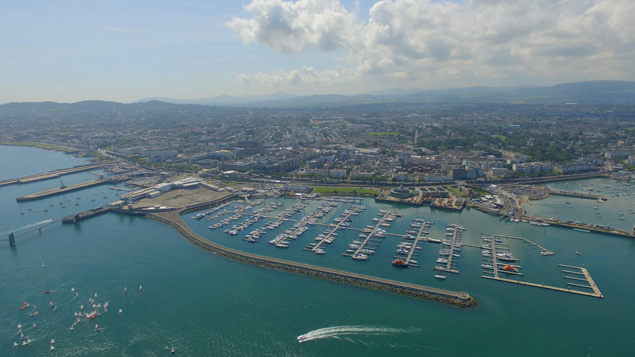 Ireland's largest marina at Dun Laoghaire Harbour is a member of the Irish Marine Federation (IMF) and the Irish Marina Operators Association (IMOA)
Ireland's largest marina at Dun Laoghaire Harbour is a member of the Irish Marine Federation (IMF) and the Irish Marina Operators Association (IMOA)
The IMF says it is strongly encouraged that these actions can be carried out in accordance with the government roadmap and that Monday, May 18th is the earliest date at which there should be a limited return to recreational boating. The government guidelines are clear and restrictions such as travel distances must be adhered to for the greater public good.
As part of the industrywide promotion of recreational boating, the IMF and its members will support the international #back2boating campaign to encourage marine recreation once again with the easing of Covid19 restrictions.
The IMF says it will continue to monitor the situation and make further updates as appropriate in line the Government's Roadmap for reopening society and business.
Call For Government To Consider Marine Sector’s Small Traders In Any Easing Of Covid-19 Restrictions
The Irish Marine Federation (IMF) has called on the Government to consider easing some restrictions currently imposed on the marine sector amid the Covid-19 pandemic response.
In an letter to Brendan Griffin TD, Minister of State for Tourism and Sport, as seen by Afloat.ie, IMF chairman Paal Janson suggests “some responsible steps” to allow small businesses within the sector to resume limited trading “in light of the considerations now being given” to a gradual easing of movement restrictions.
These steps would allow for the pick-up of a boat or boat equipment from a dealer, broker or seller “as it is considered a reasonable justification under obtaining goods and services”.
They would also allow a boat-owner to access their vessel at a marina or mooring “to male sure it is safe and compliant”, or to take their vessel to a marina or boat shed for repairs or servicing (or likewise return it to its mooring it after same).
“In addition, we would suggest that once recreational activities are once again permissible, boating is one of the more responsible and acceptable forms of enjoying the outdoors,” Janson says, provided boaters stick to the following:
- Only boat with those already in your immediate household. No guests on your boat.
- Go right from your house to the boat and back, no unnecessary contact with anyone or any loitering at the marina/dock.
- Maintain your distance at the fuel dock and when purchasing provisions.
- No rafting up, keep your distance when out on the water.
- Wash your hands any time there is contact with shared surfaces.
- Be safe and responsible, do nothing that would require the assistance of the rescue services.
“The Irish Marine Federation is committed to ensuring that the safety of its members and customers alike is of overarching importance and hopes to be able to work with the relevant Government authorities to see a gradual return to a safe and responsible recreational activity,” Janson adds.
The Irish Marine Federation (IMF) has joined a call by European boating industry associations for support from the EU to address the Covid-19 outbreak and its profound effects on the sector.
Eighteen associations have signed a policy paper from the European Boating Industry (EBI) which outlines a series of suggested responses “to ensure that companies survive the crisis and can secure jobs” — jobs which, it says, number some 280,000 in 32,000 companies across the EU.
These responses include the introduction of a voucher scheme for tourism activities, open borders for goods and deliveries, as well as a risk-based approach to restarting marinas, production and tourism in anticipation of the summer season.
EBI also calls for “strong communication from the European Commission and national governments to inspire consumer confidence in the safety and attractiveness of maritime tourism”.
Regarding the local situation in Ireland, the IMF says it has opened channels of communication with the HSE with relation to the marine sphere “and the many issues that exist within our industry”.
Information on business supports is available from the Government and from Fáilte Ireland, the federation advices.
And following its call for marine industry staff to be recognised as essential workers, the federation refers to its response from the office of Business Minister Heather Humphreys with a guidance list of services deemed essential.
The IMF recommends that any specific queries in relation to Covid-19 and measures to mitigate its impact on the maritime transport sector should be sent to [email protected]
“I think it is fair today that the business situation is foremost in all our minds and what we can do to continue trading, in whatever capacity, to keep the light on over the door until we come out the other said,” said chairman Paal Janson in a letter to IMF members.
In the meantime, the IMF says it is in regular contact with industry associations, as well as marina owners and operators, the world over “in an effort to understand the issues that marine industries in other countries are going through and any relevance that may have to us in Ireland”.
Janson added: “The federation will continue to work on [members’] behalf and do whatever it can to support its members and help them through this difficult time.”
The EBI policy paper is attached below.
The Irish Marine Federation (IMF) is promoting a necklace of over 60 Irish coastal marinas and pontoons as a central theme of its London Boat Show promotion that opens at ExCeL in London's Docklands on Friday morning.
As Afloat.ie reported previously, the Irish trade body is supporting the Irish Marina Operators Association (IMOA) who are keen to attract more visiting UK boats to Ireland this Summer. Eight Irish marinas have made the 'voyage' to London to promote their coastal facilties to the estimated 100,000 UK boating enthusiasts that will visit the international show over the next ten days.
Marinas from Eight Irish Counties Represented
Dublin marinas at Dun Laoghaire and Malahide and Cork Harbour Marinas at Royal Cork Yacht Club in Crosshaven along with Greystones marina in Couty Wicklow, Carlingford marina in County Louth and Kilrush Marina in County Clare, Kimore Quay in Wexford and Fenit in County Kerry are among Irish marina representatives manning the Irish stand. 'The aim is to assist UK visitors planning a trip across the Irish sea this Summer to enjoy the full benefits of the Irish coast' says IMF Board Member Gerry Salmon of MGM Boats who has co–ordinated the Irish stand and hopes it will be the start of a regular appearance for Ireland at the International exhibition.
#DunLaoghaire Marina will be there to market our destination to UK marine leisure tourism. https://t.co/45SiExuvqv
— Dun Laoghaire Marina (@DLMarina_Dublin) January 5, 2016
Visit us on the Irish Marine Federation stand at London Boat Show 2016 #LBS16 @eucoolroute https://t.co/KKq9esoP5E pic.twitter.com/JqsMCExLY4
— RCYC (@royalcork) January 8, 2016
Lucy Watson, star of hit Channel 4 series ‘Made in Chelsea’, will open the 62nd annual London Boat Show at 11am oin Friday.
Thousands of boats and brands will be showcased at the event all from leading British and international companies. Exhibitors will range from world-class boat builders through to fashion, travel operators and watersports companies – ensuring there is something for everyone.
Spectacular Show attractions will include a Mediterranean Bay with waterfront cafés and a specially built pool hosting live demonstrations. There will also be hundreds of boats to climb aboard, a 60’s Revival showcasing boating highlights from the era, and themed discussions led by industry experts in the London Boat Show Theatre.
Last March, The Irish Marine Federation (IMF) met in Dublin to address priorities for the marine leisure industry after what has been a torrid time for marine trades in Ireland.
In a notice to members, Federation Chairman David O'Brien said 'like all small businesses, the IMF is building anew after recession'.
In a cautious note of optimism, O'Brien added 'Although it still remains to be seen if we really have 'turned a corner', as our politicians like to tell us, nothing can stay dormant indefinitely.
The IMF, who organises the National Boat Show, expects new opportunities to arise as the economy improves and consumer confidence grows.
Salmon also hopes to recruit new members for the IMF in London: 'The purpose of the stand is to highlight the benefits of being a member of the IMF in the absence of any planned events for any of our members in Ireland. The London show is the only international marine orientated event that is close to Ireland and one which attracts a number of Irish clients and companies'.
Members and non-members are most welcome to call by the stand F046, conveniently located near the Guinness stand.
Irish Marine Federation Welcomes Changes to Foreshore Act
#foreshore – The Irish Marine Federation (IMF) has given a cautious welcome to much heralded changes to the foreshore bill that is designed to streamline the development consent process.
The government has published its Legislation Programme for Spring/Summer 2015 and the Maritime Area and Foreshore (Amendment) Bill is among a list of key Bills of interest which currently before the Houses of the Oireachtas.
The Bill will streamline the development consent process for the foreshore, including the integration of certain parts of the foreshore consent process (under the Foreshore Act 1933) with the existing on-land planning system.
The IMF, the national federation of the marine leisure industry in Ireland, has long held out that the failure to manage Ireland's natural resources "in a consistent or coherent manner" has led to serious setbacks in the support of marine tourism on the island.
The IMF has long argued the State must develop a clear and simplified pathway for the licensing of offshore and foreshore activity - in marina development, aquaculture, and energy exploitation. Currently, there is no timeframe for the granting of permissions leaving many developers facing a lifetime of unneccesary bureaucractic hurdles that stymies development, according to one marina developer.
In 2002, there was an attempt to address this when the Marine Institute published 'A Development Strategy for Marine Leisure Infrastructure'. Shortly afterwards, however, the responsibility for marine tourism research was transferred from the institute to the then Department of Arts, Sport and Tourism. It would appear that during this move, a disagreement over how this new responsibility for marine infrastructure was to be resourced led to its not being resourced at all.
In 2007, the Marine Institute followed up with another report - the Marine Tourism and Leisure Development Strategy 2007-2013 - which valued the water-based tourism and leisure sector at €630m and anticipated it would grow to €1bn by 2013.
That report identified a failure to manage Ireland's natural resources "in a consistent or coherent manner" in support of marine tourism. That report, and and its recommendations, was left to gather dust alongside its 2002 predecessor.
So it is something that the Government's new marine plan, 'Harvesting our Ocean Wealth' aims to develop a national maritime spatial plan, and recognises the need to engage with experts and stakeholders. But it is imperative that government does not overlook the various barriers and pressures that exist in our various sea areas.
Above all, the key to unlocking Ireland's marine potential, according to the Irish Marine Federation is to complete the necklace of marinas around our coast - marinas which can provide a lifeline for struggling coastal communities with the sort of jobs that cannot be shipped abroad.
Ireland has a chronically underdeveloped marina system. The single marina in La Rochelle, France, for example, has the same capacity as our entire island. There are more berths in North Wales alone than there are in all of Ireland.
Marinas create small hubs of marine enterprise, supplying services to cater for the boat owners gathered there or just visiting, and bringing massive spin-off benefits for the neighbouring coastal communities. Studies show that for every €10 spent by a yachtsman in a marina, €100 is spent in the local town in shops, pubs and restaurants.
A visiting overseas boat leaves €132 per night. A visiting Irish boat leaves considerably more at over €300 per night. The average spend of a boat owner in a marina berth is in excess of €8,000 per annum. Most of this stays in the local community. One full time job is supported by every 3.7 marina berths according to Federation reports.
#irishmarinefed – The Irish Marine Federation (IMF) meets in Dublin tomorrow to address priorities for the marine leisure industry after what has been a torrid time for marine trades in Ireland.
In a notice to members, Federation Chairman David O'Brien says 'like all small businesses, the IMF is building anew after recession'.
In a cautious note of optimism, O'Brien adds 'Although it still remains to be seen if we really have 'turned a corner', as our politicians like to tell us, nothing can stay dormant indefinitely.
The IMF, who organises the National Boat Show, expects new opportunities to arise as the economy improves and consumer confidence grows.
O'Brien explains that the IMF was only able to keep afloat in recession by slashing costs and running almost entirely by its volunteer committee. 'We may be a long way from the dizzy heights of the IMF 2006 Boat Show at the RDS but equally we're a long way from 1984 when VAT was 35%, the top rate of income tax 65% and mortgage rates hit 16%. Even then we managed to run a show...!'
In whatever form the next wave of activity comes, the IMF says it is ready and waiting to embark on a 'new chapter' for the industry. The IMF is keen to take on board views and suggestions and is also on a recruitment drive for new members.
The IMF agm takes place tomorrow at the National Yacht Club in Dun Laoghaire followed by a meeting of its Board who will focus on identifying IMF priorities for 2015 and 2016.
The new IMF website is operational at www.irishmarinefederation.com and the IMF is also on twitter @irishmarinefed
British Marine Federation To Run RCD Awareness Course
Are you involved in boat sales? Are you up to date with the recrecational craft directive (RCD)? The British Marine Federation is to run a newly updated course, which includes all the latest information on requirements for the Recreational Craft Directive at it Surrey premises.
The Course is relevant to: All those with responsibility for the design and construction of recreational craft, for example: directors, managers, designers, consultants and surveyors;
It is also useful to all those involved in boat building who are responsible for the supply of equipment to any new boat, including engine suppliers; DIY builders who wish to CE Mark their own boats and the importers of agents for boats built outside the UK.
More from the BMF here



























